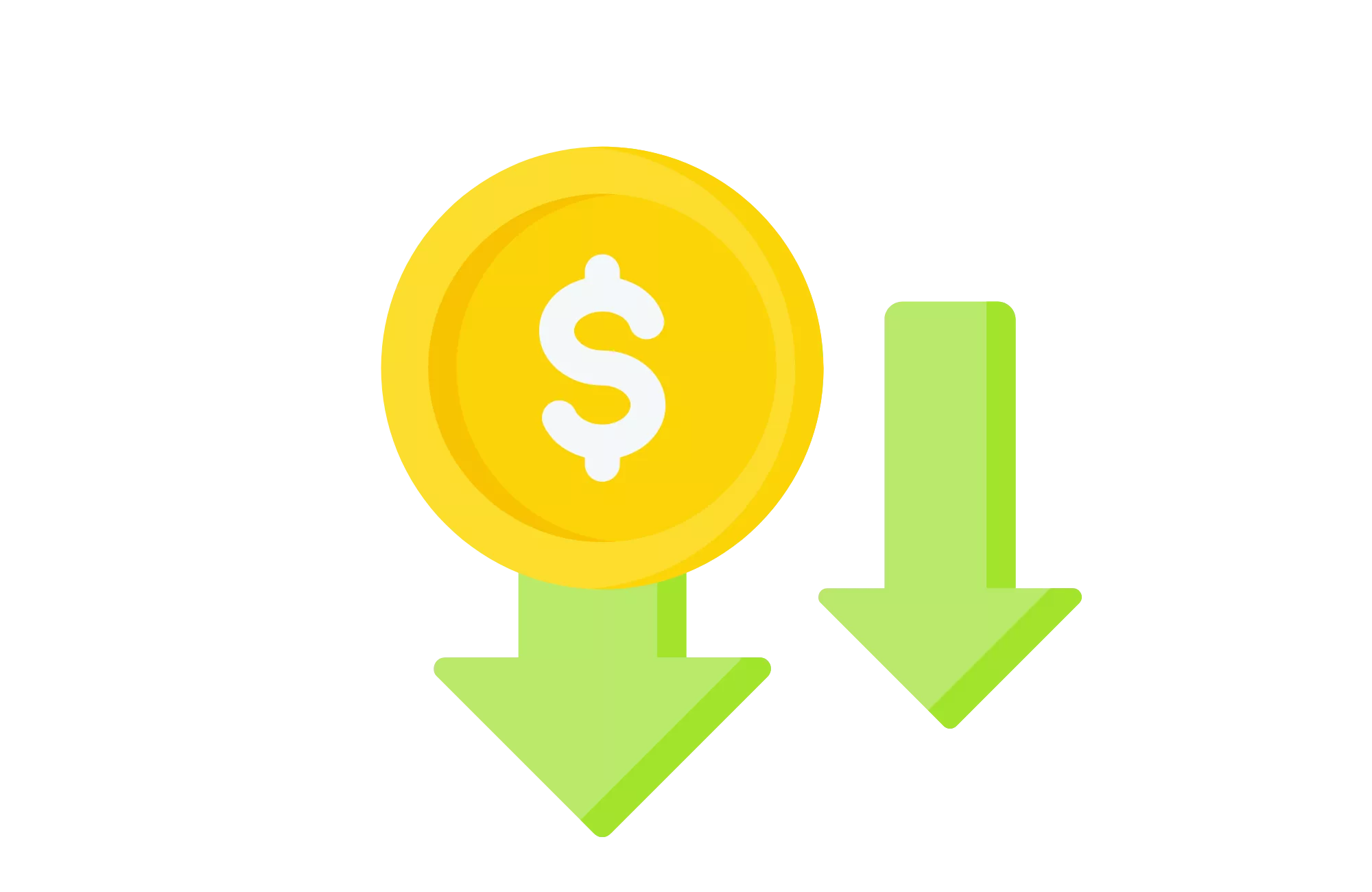TABLE OF CONTENTS
- 1. Understand Credit Card Processing Terminology
- 2. Determine if You Need a Merchant Account or Payment Service Provider
- 3. Learn About Fees Associated with Credit Card Processing
- 4. Identify the Best Pricing Structure for Your Business
- 5. Shop Around for the Best Rates and Lowest Markups
- 6. Opt for Month to Month Contracts
- 7. Find Out if You Qualify for Level 2 or Level 3 Processing
- 8. Use the Cheapest Payment Processing Methods and Card Types as Much as Possible
- 9. Avoid International and Miscellaneous Fees
- 10. Lower your Risk of Fraud and Chargebacks with a PCI-Compliant Gateway
- 11. Accept ACH Payments for Lowest Merchant Fees
- 12. Consider Zero-Cost Credit Card Processing
- 13. Use a Trustworthy Merchant Service Provider with Transparent Pricing
- Cheapest Merchant Services for Small Businesses: Final Thoughts
For many small business owners, credit card processing fees are a powerful blow that cuts into profits. With cash transactions declining, we are starting to see the majority of consumers make most of their daily purchases via card. This means that accepting credit card payments are vital to keeping your business running. The goal is to offer this convenient payment method to customers.
Take a look at these 13 tips for getting the cheapest credit card processing for small businesses and lowering your processing fees.
1. Understand Credit Card Processing Terminology

Before you start shopping around for the best payment processor, familiarize yourself with credit card processing terminology. Understand pricing structures and other fees associated with a merchant account.
While shopping keeps your business’s metrics on hand. Processing rates change depending on your credit card volume, average transaction amount, risk assessment, and more. You’ll also need to consider the types of credit cards your customers use, the payment method you accept, and your chargeback ratio. These factors will determine the best processing rate for your business.
2. Determine if You Need a Merchant Account or Payment Service Provider
You may think it’s easier to simply work with a payment service provider like Square or Paypal that offer modern and sleek technology. However, these types of payment solutions charge high rates and have a reputation for not providing the best customer service.
If you’re interested in the lowest credit card processing rates, a dedicated merchant service provider may be the right choice for you. An MSP will be able to set you up with a merchant account that provides you with a payment processor and payment solution that is best suited for your business.
3. Learn About Fees Associated with Credit Card Processing
Credit card processing fees are often made up of many different fees bundled by one service provider. Before you secure a processor, take the time to understand the various fees associated with credit card acceptance.
Transaction Fees
Transaction fees work as a charge on the percentage of your business’s sales. These fees typically range from 1% to 4% of all credit card transactions. Certain processors may have an additional fixed fee for each transaction.
Service Fees
A payment processor may choose to charge a monthly fee or annual service fee. This is a base fee for retaining their services. Note that this fee is charged in addition to and not instead of transaction fees.
Equipment Fees

Accepting credit cards in person requires a point-of-sale (POS) system. This could be a physical terminal, mobile card reader, or virtual terminal. While there are options to purchase your own equipment, some payment processors provide merchants with the necessary machinery for free. Other payment processors choose to lease or sell the required equipment to businesses. Additionally, processors may charge equipment installation or activation fees. When looking for a payment processor be sure to analyze the equipment requirements and any associated equipment fees.
Incidental Fees
Incidental fees are occasional fees that occur in specific situations. They are also one-time fees that cannot be predetermined. While they may not be fixed, you should still work to factor these fees into your budget as they will inevitably occur at some point. Processors charge incidental fees in the circumstance of complicated transactions such as those involving chargebacks, insufficient funds, or specialized verification services.
4. Identify the Best Pricing Structure for Your Business
There are different pricing structures associated with credit card processing. The best pricing structure will depend on the specifics of your business. Before settling on a processing service, learn about the various pricing structures and their ideal business partners. Choosing the right pricing structure for your business can make a huge difference when looking for cheap credit card processing for small business.
Flat Rate
In a flat-rate structure, merchants pay the same rate for every transaction. In most cases, this would consist of a percentage combined with a small fee. This pricing model is suggested for businesses with low-priced monthly transactions.
Interchange Plus
The interchange-plus pricing structure leaves room for negotiation. Therefore, this pricing model is much better for businesses processing a high amount of credit card transactions. With interchange plus, it includes the interchange price and the markup to that price. The interchange price varies based on the fees charged by the different partnering credit card companies but the markup will always remain the same.
Tiered Pricing
The tiered pricing structure can be beneficial if the cards you take are typically qualified cards. In this pricing model, merchants pay a variable rate in three different tiers. Your payment processor decides on which transaction qualifies for each tier. It can be quite technical, which leaves merchants confused about how to determine an estimated monthly budget.
5. Shop Around for the Best Rates and Lowest Markups
It’s important to not only look for the lowest rates but also shop for the lowest markups. Credit card processing rates include non-negotiable fees like interchange and assessment fees paid to credit card issuers and networks. Processors cannot alter these fees as these fees are out of their control and determined by the issuing banks and card brand networks. Processors do determine their own markups. This refers to the amount you pay for processing in addition to the non-negotiable fees of the issuing banks and credit card networks. Therefore, you can’t simply look at the rates of processing, you have to examine the markup of each payment processor.
6. Opt for Month to Month Contracts
Newer or growing businesses should avoid lengthy binding contracts. As your business grows and changes you won’t want to be stuck with rates that no longer fit your sales numbers or payment methods. These contracts are often difficult to dissolve and if you are lucky enough to break free it’s typically at the price of high termination fees. Instead, find greater flexibility with month-to-month processing agreements or servicers without subscription requirements.
7. Find Out if You Qualify for Level 2 or Level 3 Processing
B2B or B2G businesses can save up to 1% in interchange fees with level 2 or level 3 processing. With these data processing levels, businesses collect more transaction information for credit card networks. In exchange, merchants pay lower interchange fees. Businesses that utilize these processing levels are required to conduct self-assessments and comply with the requirements of credit card brands. It is more work for merchants, but the savings may be worth the extra effort.
8. Use the Cheapest Payment Processing Methods and Card Types as Much as Possible
Depending on which kind of credit card your customer uses, the cost of processing varies. Visa, MasterCard, American Express, and Discover all have different merchant processing fees. Corporate cards and rewards cards carry higher processing fees. Basic credit cards, like debit cards, contain lower processing fees, saving your business money with every swipe.
If you have a way to get your customers to use the cards with the lowest processing fees, your business will save money.
Which credit card processing is the cheapest for small businesses?
Another thing to consider in the journey to finding the cheapest credit card processing for small business is how your business accepts payments. Do you offer one method or a variety? Do your customers have a preferred payment method? Small businesses accept payments in a variety of ways, the most common methods include:
- In-person: This method is the lowest-risk option for merchants to offer and typically have the lowest credit card processing fees. This payment method requires merchants to possess a POS system.
- MOTO transactions: MOTO transactions are typically considered higher risk and are associated with higher processing fees. The high-risk stems from credit card information passing verbally over the phone and then the manual entry into a card reader.
- Online: Online transactions also include higher processing fees. This is due to eCommerce businesses likely being hit with fraud.
Do what you can to take credit cards with the lowest amount of risk. These efforts work to save your business money in processing fees and maintain a higher profit for each sale.
9. Avoid International and Miscellaneous Fees
The acceptance of international credit cards comes with higher processing fees. It is not uncommon for processors to hike up international fees. Therefore, you should look into the associated fees for international credit cards before settling on a credit card processor or prior to agreeing to accept international cards.
10. Lower your Risk of Fraud and Chargebacks with a PCI-Compliant Gateway
A payment gateway is a credit card processing software that connects transaction information between the credit card network and the card-issuing bank to authorize each payment. Once payment is approved, the payment gateway then delivers funds from the customer’s credit card to the business’s account.
Obviously, this process handles a lot of sensitive information pertaining to both the customer and the merchant. Therefore, for the safety of both sides, a gateway that follows PCI compliance guidelines will help keep credit card data secure. This includes specifications like tokenization, fraud detection software, and encryption technologies to offer the utmost protection for both transactional parties.
11. Accept ACH Payments for Lowest Merchant Fees
Automated Clearing House (ACH) payments are widely popular in the US. This payment method which transfers funds from one bank account to another is typically cheaper than processing credit card payments. ACH transfers are common for B2B transactions as well as recurring payments like subscriptions and memberships. Merchants should note that ACH payments are not quite as convenient as credit card payments.
12. Consider Zero-Cost Credit Card Processing
Zero-cost credit card processing is a way for businesses to process payments without seeing processing fees against them. In general, this works one of two ways via surcharging or cash discounts.
Surcharging
With this method, a surcharge is added to every credit card transaction. If a customer selects a credit card as their payment method a fee is added to the cost of their purchase. The surcharge will cover the processing fees for that transaction.
Cash Discounts
Utilizing this method is more like rewarding your customers for paying with cash instead of a card. The prices in your store will reflect a price that already adds to credit card processing fees. This ensures that customers know the price their paying prior to checkout and aren’t alarmed by a surprise extra added fee. If a customer uses cash, then they will receive a discount at the checkout counter that brings the price back down to the cost before the markup.
Both of these methods allow merchants to offset their credit card processing fees. The utilization of zero-cost processing works to lower or even eliminate the cost of payment processing for your business. Each state has its own laws with zero-cost processing so it is best to speak with your merchant service provider about it.
13. Use a Trustworthy Merchant Service Provider with Transparent Pricing
Be wary of hidden fees. Too many merchant service providers bulk up your bill with additional fees for their processing services. These unnecessary charges can be gut-wrenching for your business’s financial well-being. Watch out for add-on fees and binding agreements like:
- Application/setup fees
- Monthly or annual minimums
- Long-term contract requirements
- Mandatory support fees
- Installation and/or upgrade charges
- Statement fees
- PCI compliance fees
- Termination fees
Take the time to find a credit card processor with transparent pricing. Make sure the provider you choose has an experienced chargeback management team to properly handle any sticky situations that may arise for your business and to keep your finances as safely protected as possible.
Cheapest Merchant Services for Small Businesses: Final Thoughts
Credit card processing fees quickly add up to hundreds or even thousands of dollars each month. Keep in mind that credit cards are the preferred payment method for many modern consumers. In the end, most merchants conclude that they will attract more customers and greater sales if they secure credit card processing. Searching for the lowest pricing possible helps to keep the financial status of your business in good standing.







